Busy big-&-small-screen actor Matt Crabtree returns to the stage this holiday season, once again understudying the role of Crumpet in The Blank Theatre’s 4th annual staging of David Sedaris’s one-man Christmas memoir The SantaLand Diaries. Matt recently took time out of a busy schedule to sit down and answer just about every question this inquiring mind has wanted to know since first seeing the North Carolina native onstage in the Blank’s monster hit The Book Of Liz back in 2006. Here’s our chat:
Matt, so many of the performers I’ve interviewed have known from the start that a career in entertainment was their life’s goal, but in your case you got your BS in Biology and were planning to continue your studies at the Medical College of Virginia. What stopped you from taking the direct route to show biz?
I didn’t really think being an actor was a viable option. I always had the need to entertain but was a very shy kid with a stutter until I was a senior in high school. I always loved doing theater and did it throughout college and was getting paid locally to do theater, but there was that old-world mentality in me that said I needed to have a job that could pay the bills. I was a science and math nerd, and continued with my studies that I thought would always be my “backup plan.”
Were there any theater people in your life before going away to college?
I didn’t know any showbiz people growing up in my small town of McLeansville, so the big shock was going to a Baptist University and meeting all these “different” people. Man did I end up fitting in.
So what shows were you doing before you decided to make a career out of performing?
While in college, I did several productions I got paid for—The Sound of Music, Lost in Yonkers, and She Loves Me at local community theaters—and spent two summers as a dancer at The Lost Colony on the Outer Banks of North Carolina.
After appearing in a National Tour of She Loves Me, you next continued your roundabout trek to Los Angeles by heading to New York. What prompted you to pick The Big Apple rather than your ultimate destination?
I’m a theater guy. I loved being on stage … that feeling you get when all eyes are on you and you get to tell these amazing stories and hopefully move people in the process. Plus the She Loves Me tour began and ended in NYC. I decided to give it a go.
What part of your New York life stands out most in your memory?
The energy of the city. There’s nothing like it. You walk out of your apartment and you are in it. You pack for the day and you don’t come back until you need to. Also, finding all kinds of odd jobs, from being a “husher” during matinees at the Walter Kerr Theatre, to proofing the casting notices at Backstage Newspaper to being a temp in Emanuel Azenberg’s office… But my favorite was working for the incredible William Ivey Long.
You could of course have crossed the continent to L.A. as your next step, but instead you toured Europe in West Side Story. What was your favorite part of the European tour?
Favorite part? Getting paid to see Europe! Mark Reiner, the casting director, called me one day and said “Crabtree. They want to offah ya Chino in West Side Story in Europe. Ya wanna do it?” I actually hesitated for a moment. I thought back to that moment in Richmond, Virginia where I sat on the phone with the producers for She Loves Me, and looked around at the new life I just started and the potential I had in that city to be with the love of my life and the opportunities that a career in nursing would have given me, and realized I would never forgive myself if I didn’t do it. That was a life-changing chance I took leaving Virginia with She Loves Me. It changed my life and I knew going to Europe was yet another experience I would regret if I didn’t do it. I had two days to pack and settle stuff before hopping on a plane to Berlin.
Wow! You next got a tad closer to L.A. by stopping in Chicago for a while, where you studied at Steppenwolf. What was it like for you being part of the fabled theater world of The Windy City?
It was the hottest summer I had ever experienced, but The School at Steppenwolf taught me the value of The Ensemble. Most of the time in NYC it was all about you as a person. In Chicago, we worked as a group and it was an extremely valuable lesson to me—to trust the people you’re with and make it all about the work. It changed the way I approached the story and it helped take away all my insecurities and made me a better actor. It wasn’t about people seeing me. It was about me telling stories in the best way I knew how.
I’m assuming that when you finally decided to pack your bags and move to L.A. it was because you wanted to do more film and TV work.
The stage is where my heart lies but with TV you can reach a wider and broader range of people. So I came out in the hopes of being able to affect more people with my humor and make more people laugh a bit more. I took a trip out here in 2000 and stayed with this girl I met in Chicago to get the lay of the land. I had a great time here in L.A. doing casting director workshops and realized then that this was the place I needed to be. I went back to NYC and an actor I met here searched for an apartment for me. She found an apartment and I bought a $125 one-way direct ticket.
How long did it take you to book your first TV guest shot, on Diagnosis Murder?
It took me a year.
And how did that come about?
I started off doing casting workshops, the best way for a new actor to meet casting directors. They were affordable then and it was a way to network and show people what you had. CDs had a way of remembering you for at least a few weeks since at that time they didn’t do a workshop every night meeting thirty new actors as they do now. You stayed in their files and were fresh on their mind, fresh enough that Jan Powell called me about a year after I met him. It was a Friday in NYC packing up the rest of my stuff and he called and said “I have the perfect thing for you.” It’s an audition for Monday. So I packed, flew out Monday a.m., arrived at LAX, went straight to their office on Balboa … and booked it.
So what advice would you give Hollywood newcomers hoping to follow in your footsteps?
Advice? Don’t give up. If this is what you really want to do, make every appointment, say yes to everything, and don’t take rejection personally.
You’ve been lucky enough to become that rarity in L.A.—a bona fide working actor with film credits like The 41 Year Old Virgin and guest shots on TV series like Monday Mornings, Greek, Bones, and NCIS? What’s your secret in getting seen and getting cast in Hollywood?
There is no secret. We all have our ups and downs. I had a bad streak for a few years but if you keep at it, you always bounce back. The only secret is to show up. Study. Work hard. You live and do the work for you. Don’t pretend to do it for anyone else. When the time is right, the world will find you. It will happen. And stay in the theater, the best training out there. If you can’t create a character and hang on to it for two hours at a time on stage, how will you ever do three months on a movie shooting out of sequence? Theater-trained actors are the best!
Speaking of which, one of the most impressive aspects of your career is your continued interest in doing live theater in L.A.’s best kept secret, its thriving theater community. What keeps you coming back to the stage, whether in major productions like Reprise’s How To Succeed or small blackbox productions like the recent Epic Proportions?
Nowadays it’s about working with people I respect and admire. I don’t do theater to be seen (although I do think people should see my work!). I do it to keep on my toes and to be with a group of committed people who share the same passion. I like how people look up to the way I approach my work, how I behave on and off stage, and to be able to share my knowledge of theater, especially here in L.A. There is a respect for the theater that is sorely lacking from performers and audience members alike … and that is something I would love to change.

Matt (2nd from left) in How To Succeed…
What kind of parts most appeal to you?
I love me a good pratfall. I like roles that challenge me. I beam with pride when directors and producers ask me to play multiple roles in a show. Need someone to fall down: Crabtree. Need someone to play twelve characters with seventeen changes in eighty-five minutes: Crabtree.
What about musicals, like the smash hit Joe’s Garage?
After having stopped singing when I left NYC, I was brought back to life, as it were, with a musical about Lucille Ball and Desi Arnaz called Dance With Me aka The Cuban And The Redhead that my friend in NYC was producing a reading of here in L.A. and asked me to be in the ensemble. I got that the same day as Joe’s Garage and I felt I was back in the game.
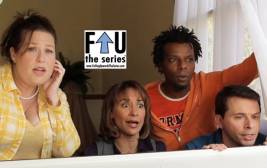
Diedra Edwards, Michelle C. Bonilla, Pip Lilly, and Matt in Failing Upwards
I know that one of the projects that’s kept you very busy over the past year or so is the hilarious web series Failing Upwards, in which you are not only the top-billed star but, along with Michelle C. Bonilla, one of the series’ co-creators and executive producers. How did you and Michelle come up with the concept and how did you go about getting all six Season One episodes of Failing Upwards in the can?
We had an idea last year about creating our own content playing characters that we love but don’t always get a chance to play onscreen. So we started writing this fun single camera comedy about four misfits in their late 30s who were going through unemployment together and some odd jobs that keep food on the table while they kind of “skirt the system.” In January we set a date of May 3 to shoot all six episodes in four days. That gave us time to raise money, get union signatories together, and raise awareness of the series. We went through SAG, DGA, and WGA because as members of a union, we wanted to “do it the right way” from a producer’s standpoint. We grabbed out director and most of our crew came through his referrals.
Web series seem to be to be to TV what 99-seat theater is to larger Equity productions in that they offer far more opportunities to “do work” and “be seen” than the usual network and cable offerings. Is that one reason that the genre appealed to you?
The main reason was to do work, and to show others that we are not just actors. We can create content. We can produce. We can write. We’re not just sitting back waiting for the phone to ring. And yes, as I say on my tours, “everything about Hollywood is seeing and being seen. If you are not seen, you don’t exist.” So we wanted to increase our presence in the world. But in the end it was all about doing good fun work that people may want to see and laugh at. Keeping busy and not getting complacent.
One of your most successful theatrical gigs was your role in The Blank Theatre’s smash hit The Book Of Liz. Besides its record-breaking long run, what most stands out for you in that rare show, one which (if I’m not mistaken) moved from a 99-seat production to an Equity contract?
We ran for 175 shows and I did 173 of them. We went into an AEA per-performance contract and I do believe the show could have run even longer. I became vested in Actors Equity because of Liz. I created some of the best friendships that I still have today. As a whole, we try and support each other and our projects as best we can. So the love and friendships I got from that cast, which continues today, is what stands out the most.
You returned to The Blank last year as Paolo Andino’s understudy in The SantaLand Diaries, directed by Michael Matthews. Was this a theatrical piece you particularly wanted to be part of?
I’ve wanted to do SantaLand for a few years. I love Sedaris and feel our senses of humor are similar. Well he did grow up mostly in North Carolina too.
So how did your participation in the project come about?
I had approached Daniel Henning and Michael Matthews and told them, “I want to understudy because I want to learn this show.” And they luckily said yes!
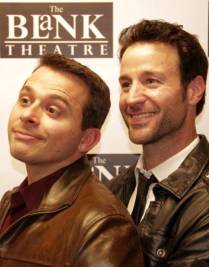
Two Crumpets: Matt and Paolo Andino
What was the rehearsal process like for you as The Understudy?
During the first rehearsal process, I watched, absorbed and then went off on my own to create my characters and learn the script. The first year, I went over to Paolo’s house and just helped him learn the lines. It helped me as much as it did him. I snuck into the theater before everyone else was there and just ran the bits and pieces. I had two onstage rehearsals and only one of them was a full dress tech before I did my first show last year.
Did you have any guaranteed performances when you first signed on to the project?
At first there was no guarantee of any shows. I came onboard to learn the show and about one week before we opened they told me I was going to get the first Wednesday night show after Opening Night. After I threw up a bit and panicked, I threw myself into it and managed to pack the house, and when I did that, The Blank kindly offered me the second Wednesday night.
So how does doing The SantaLand Diaries compare to other shows you’ve done?
The show is tough!! Seventy-five minutes and fifty characters with no intermission. Watching some of the amazing characters Paolo did made it even more difficult. I tweaked a few for me, but some of his are just so brilliant I didn’t want to come anywhere near them. So I got a chance to be even more creative with these words I love so much. We are two different Crumpets. And the wonderful thing about it is … they both work.
I had the great good fortune to be there last year for your SantaLand debut, a bravura performance that went off without the slightest hitch and earned you not only deserved audience cheers but a second performance. How nervous were you about that baptism by fire?
First of all, to have you there was a great gift. You are an amazing man and supporter of theater here in L.A. Everyone knows Steven Stanley, and there is not one regular theater performer here in L.A .that does not know your name.
You’re too kind. I’ve met tons of actors who have never heard of me or StageSceneLA. But we digress. Back to how it felt for you doing that first performance. How was it doing it in front of a packed house?
Since it was my first audience, I had to adjust some of my rhythms. I kept freaking out thinking, “If they laugh, I’m going to forget where I am and there is no one there to save me!” A one-man show is very different because you have to be so confident in the material that if you need to, you can get yourself out of any jam. Also, having the audience packed with friends and colleagues who knew how much this show meant to me put me at a little ease, but then again you don’t want to disappoint them.
Is your prep for this show any different from other shows you’ve done?
Whatever the show, I always want to run “bits and pieces” before the performance, but when it is one big seventy-minute “Bit and Piece,” you just have to say the first few words and hope the rest come out in the right order!
Is it any tougher learning an entire one-man show than say learning an equal number of lines in a two-hander?
A bit more tough, yes. There’s no one else to talk and listen to. Acting is all about listening and responding, so when it’s just me, then I have create, imagine, listen and respond to all these people I have created. The good thing is I can change their intentions! And only have to put up with one diva. I alone control this show!
What does an actor do when there’s no one sharing the stage as a kind of safety net?
What does an actor do? Panic!!! Then breathe and just trust I have done the work to make it happen.
Clearly the folks at The Blank Theatre were more than approving of your work last year, bringing you back for a second go (and two more guaranteed performances) as Crumpet. How does it feel a year later? Are audiences mostly made up of Matt Crabtree friends and fans or do you have people show up just out of curiosity to see another take on the David Sedaris-based character?
Last year, there were about fifteen people I didn’t know from each show and they came up to me after the show and said “You’re the understudy?” I even ran into a few on the street a few weeks later and said how much they liked it. But mostly I’ve relied on friends. Friends come out in support so I had to change the characters up a bit this year, so they don’t see the exact same show again.
Recently you got a last-minute call to go on for Paolo. What was that performance like for you as compared to audiences who’d come specifically to see you?
My first non-Crabtree audience was exhilarating. A different beast. Watching fans of Sedaris come on the journey with you without knowing me or my sense of humor was fun to watch unfold. Seeing those smiles and hearing those guffaws from total strangers…yup. I did my job.
With Failing Upwards and this “guest star” appearance in The SantaLand Diaries, it would seem to have been quite a 2012 for you. What’s top on your goal list for 2013?
This year has wiped me out. My focus was so much on F.U. that I had to figure out how to structure my time and life. Personal life suffered a bit but am trying to get that back! As for work, I have another web series idea I have cooking in my noggin. I have a few writing projects that I’m committed to do and I want to be a Recurring Guest Star on an episodic show that turns into a Series Regular! Anyone? Anyone?
I can’t imagine anyone seeing your work in Failing Upwards (or your stage work either for that matter) and not wanting to give you your own show. But as they say, my lips to God’s ears! In the meantime, I’m very excited to be getting the chance to see you a second time as Crumpet this coming Wednesday. Thank you so much for inviting me! I look forward to congratulating you after the show!
Big hugs for you when I come out!
www.failingupwardstheseries.com

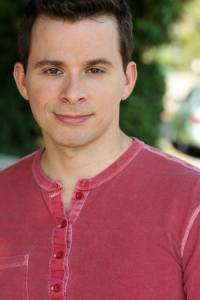
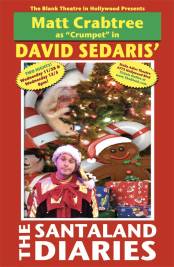
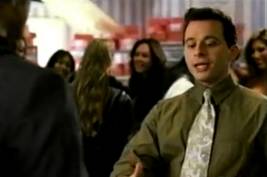
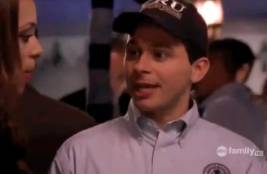
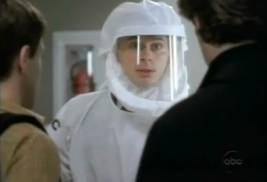
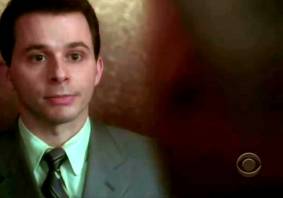
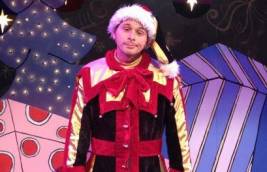
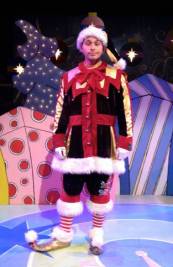

 Since 2007, Steven Stanley's StageSceneLA.com has spotlighted the best in Southern California theater via reviews, interviews, and its annual StageSceneLA Scenies.
Since 2007, Steven Stanley's StageSceneLA.com has spotlighted the best in Southern California theater via reviews, interviews, and its annual StageSceneLA Scenies.







 COPYRIGHT 2025 STEVEN STANLEY :: DESIGN BY
COPYRIGHT 2025 STEVEN STANLEY :: DESIGN BY